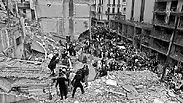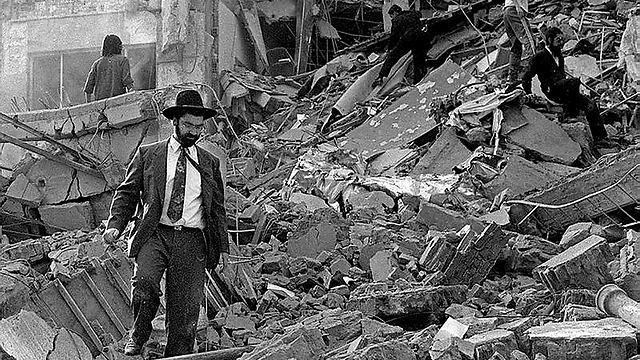
Rubble at the site of the bombing
Photo: AFP
Argentine Jewish leaders on Friday renewed denunciations of a government plan to work with Iran to investigate Argentina's worst terrorist attack.
The 1994 bombing of the Argentine-Israeli Mutual Association killed 85 people and remains unsolved. Family members of the victims commemorated the 21st anniversary of the attack Friday, a day before the July 18 anniversary.
Former Iranian officials have been on an Interpol capture list for years, but Argentine prosecutors have never been able to question them. Iran has long denied any role in the bombing.
"We ask the government to take courageous stance and intensify the demands so that the accused Iranians can someday face justice," Ariel Cohen, president of the federation of Jewish communities, said at the event held at the reconstructed Jewish center.
Argentina struck a 2013 accord with Iran to solve the attack, but Jewish groups have criticized it, saying Tehran has failed to turn over suspects. The joint "truth commission" was approved by Argentina's Congress but it has not been implemented because two Argentine courts ruled it unconstitutional, and it's now under review.
"We can't strike a deal with the murderers," Cohen said.
Just days before he was found dead on Jan. 18, Alberto Nisman, the chief prosecutor investigating the case, accused President Cristina Fernandez of helping shield the Iranian officials allegedly behind the bombing. Federal judges have thrown out the case against Fernandez.
Cohen asked authorities to solve what he called "the strange circumstances" behind Nisman's death, and criticized the government for its "verbal artillery" against the late prosecutor.
Authorities have not determined whether Nisman took his own life or was killed by someone else, and conspiracy theories have flourished.
While some believe that Nisman killed himself because he felt that his claims against the president lacked proof, others say he was murdered because he was a threat to the Argentine and Iranian governments.

















